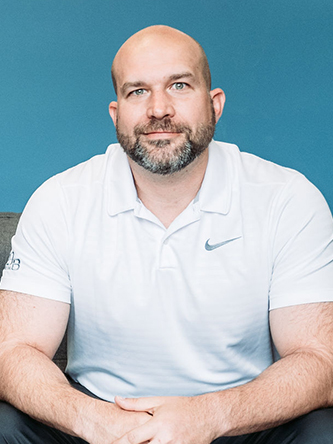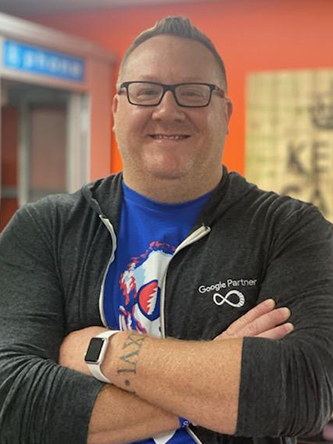YOUNGSTOWN, Ohio – The latest initiatives to protect internet users’ privacy has marketing agencies on their toes – but not ill-prepared.
By the end of 2023, Google will stop using third-party cookies in its Chrome browser, following other browsers such as Safari. First-party cookies will remain and will require a user’s consent in most cases.
But what is a third-party cookie? In short, they are placed on a website by someone other than the owner, such as an advertising network, to track and collect user data and behaviors. That data is then sold to advertisers for targeting purposes.
By comparison, first-party data requires consent, such as signing up for an email newsletter, or taking a survey, or downloading a white paper or e-book. By providing their names and email addresses in those cases, users give consent to have their data collected. The owner of that data, typically the company, can then use it for marketing purposes.

To improve user privacy, companies like Google and Apple are trying to cut down on the access marketers have to serve consumers ads based on their browsing habits, says Jeff Hedrich, president and brand strategist at the Prodigal Co., Boardman. This raises the importance marketers place on being able to accumulate first-party data, he says.
“The data that you own, no one can take that away from you,” he says. “People have opted into it.”
The lack of third-party cookies will hinder some of the traditional ways marketers have served ads to customers and prospects, Hedrich says. With big-box retailers already collecting first-party data on a large scale, he says this change could impact smaller businesses that have come to rely on third-party data sources.
For example, Facebook relies on third-party data. So, once the change occurs, it will be more difficult for small businesses to use Facebook to serve up ads to certain people, he says.
“If you’re somebody who relies totally on Facebook, it could be that once Google makes these changes, you’re going to find that it doesn’t have quite the effective reach,” Hedrich says.
While it’s becoming more challenging to target users on Google and Apple platforms, “It’s helping marketers be better with the data they have and be more precise with how they’re delivering to the audiences,” says Jeff Ryznar, owner of 898 Marketing, Canfield.

Marketers are embracing the value of blog content on websites, Ryznar says. But rather than focus on how the blog might drive web traffic or sales, companies need to understand it’s more about laying the groundwork for a website to help users find you, he says.
“It’s updated content that Google is going to crawl and serve up when people need it,” he says. “It’s almost like a repository of content or a library of content for individuals to find you when they need you.”
Blogs allow writers to be more conversational in how they write so they can match the types of phrases people are using in web searches. With more individuals using home devices, like Amazon’s Alexa, or talk-to-text devices, “They’re becoming more specified with more phrases like how we speak rather than how we type,” Ryznar says.
For example, searches for “sore back” that used to bring up results based on what Google thought you were looking for, have evolved to statements like “I’m having trouble bending over,” or “my back hurts in the morning.” This is changing how blogs and web copy are being written, Ryznar says.
898 has been preparing its clients’ websites for the change since 2020. Ryznar recommends companies update their privacy policy so they are compliant with all the new changes. All of 898’s customers updated their privacy policies in 2021 to reflect the new cookies system and “explicitly saying what they’re tracking, what they’re paying attention to with visitors who come to their site,” he says.
The expertise of IDMI, based in Poland, is information technology. Thus it has a strong grasp of security when designing client websites, says Anthony DePinto, chief information officer. Keeping a website up to date from an IT and security standpoint, as well as keeping content fresh, improves a website’s organic traffic.

Having a secure sockets layer, or SSL, certificate on a site, for example, affects its ranking on Google and other search engines, DePinto says. Sites with SSL certificates – which authenticate a website’s identity and enables an encrypted connection – are identified by the little padlock icon in the address bar.
“When Google indexes a site, they do look for that,” DePinto says. “Anything that we design, we make sure that it’s there.”
More of IDMI’s customers want blogs to keep fresh content up to date, thereby getting more pages indexed by Google and driving organic traffic,
DePinto says. To meet that need, IDMI brought on a content writer.
“This is what makes you stand out as the industry expert,” he says. “Especially now with the pandemic – hopefully we’re winding down on that. But with these businesses realizing not everybody wants to come into the store, they’re going to the website.”
In addition to embracing more content, the privacy changes require marketers and companies to do better with their content, says Steve Cross, founder and creative director at iSynergy, Canfield.
The first step, he says, is to identify the “gold customer” persona – who the company wants to target based on needs, goals and behavior. From there, companies can craft their blogs to speak to those people or contract with an agency to write the blogs.
ISynergy is using artificial intelligence to write blogs for customers, Cross says.
The agency feeds the AI system a rough outline of what the blog is about, inputs keywords, key phrases and other details, and it will generate “with precision” a number of blogs, he says.
“I bet 80% of the copy that comes out of here has some sort of AI or [machine learning] attached to it or written some of it, whether it’s a headline or it’s body copy in a blog,” he says. “It makes you more effective. It makes us more efficient.”

The blogs still need to be looked over by human eyes before posting because “nothing will ever take the place of written editorial,” he says. But for headlines and SEO content, “it’s an effective solution,” Cross says.
The biggest impact to iSynergy’s work is its efficiency to market, he says. Getting digital marketing campaigns from ideation and discovery to execution has been expedited by almost 50%, he says, particularly A-B testing of content.
“Instead of a copywriter writing five headlines and four bodies for a Facebook campaign,” he says, “now we can put it into our AI platform and it will spit four back out to us that we can test.”
ISynergy’s three copywriters have been able to turn out more copy as well, allowing the agency to take on more customers and projects, he says. This also makes copywriting services more affordable for the customer.
In addition to blogs, agencies recommend companies take stock of their social media presence. While the loss of third-party cookies may affect Facebook, companies may consider other platforms.
“Facebook has really cracked down on the amount of insights and attributes that you can target individuals by,” 898’s Ryznar says. “On the flipside, TikTok has not yet done so.”
Television ads that use TikTok videos have pushed the platform into the mainstream, making it popular among older demographics, particularly families who are producing and watching the videos together, says Prodigal’s Hedrich.
A TikTok group featuring moms had about four billion views of its videos last year, Hedrich says. “I bet this year, it will be 12 to 20 [billion],” he says.
Prodigal is preparing TikTok video campaigns for some of its customers, he says. The videos don’t require as many resources as a TV ad would – such as lighting and camera work.
“TikTok videos need to look more authentic,” he says. “But they need to be well done. Because if the content isn’t good, if it feels like just a classic ad, no one’s going to click on it, watch it or share it.”
Pictured: Steve Cross, iSynergy; Anthony DePinto, IDMI; Jeff Ryznar, 898 Marketing; Jeff Hedrich, The Prodigal Company.
